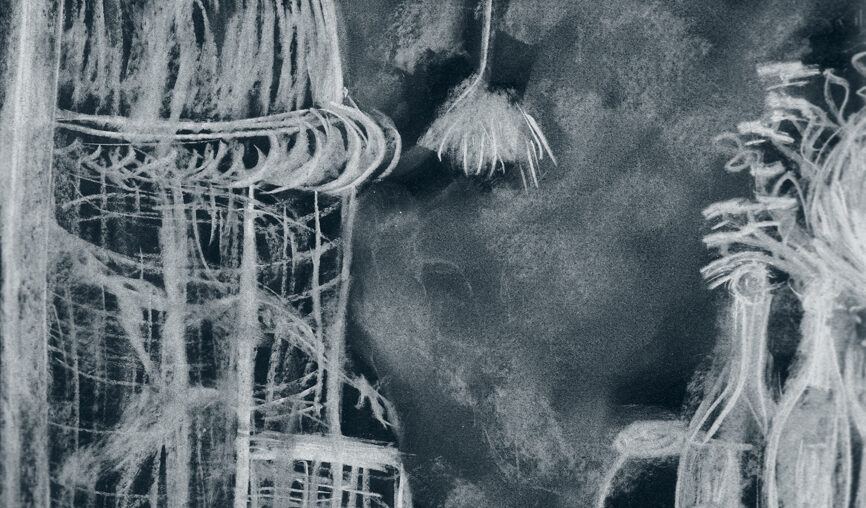Rupert is a mountain parrot who sits on eggs that never hatch. She sits on them by day and night, only leaving to eat, drink, ring like a telephone and echo the household sounds that spin round her cage.
Her owner, Myron Blum, would often insert his long, thin white finger into her cage and coo, “Good girl, Rupert.” And Rupert would echo, “Good girl. Good girl.”
Most nights, Myron would sit in his armchair by the open fire, run his finger down the list of men in his address book, and phone.
He’d listen but never speak.
Between calls he’d curl his long white fingers toward each other and tap them together, concertina style, nodding, smiling, grunting. And Rupert would echo, another grunt, the small click of the closed phone, the creak of his shift in the black leather armchair, and the silent tap of fingers.
On the wall in front of him, from floor to ceiling, are photographs. Sometimes a twosome, his parents, Jonathan and Milton Blum, or a threesome, Jonathan, Milton and Myron.
Myron at four, when he first came to them, eyes expectant, Myron at 7, eyes sombre. Myron at 12, gaunt, pale, eyes defeated like a trapped animal.
Mondays at 9 Marika comes. Long legs; tight jeans, mop, bucket.
Myron adjusts his spectacles and turns the pages of the weekend paper, but still follows her rounds, turning away when her jeans dig into her buttocks as she bends for the bucket.
With each clatter of her bucket and clap-clap of her scuffs on the linoleum floor, Myron turns another page of his paper. The louder the clatter, the broader the buttocks, the more furious the turn of the page.
And when Marika is gone, Rupert repeats: the clatter of the bucket, the clap- clap of the scuffs, the crackle of the page-turn and the tap tap tap of Myron’s silent fingers.
Each Monday, when Marika enters, a whiff of normalcy blows in.
A whiff of another life, a wife, a house, a car, a child, a dog, a coffee together in the mall, a joint venture into grocery shopping, furious loving at night and the clap clap of scuffs on the floor. And his photographs, so dutifully hung on the wall, are all wrong.
One Monday, Marika doesn’t come. The next Monday, the same.
Rupert repeats, over and over, the turn of the door handle, her clap-clap entry, the clang of the mop bucket, the flick of the paper, and one by one, Myron removes every family photograph off the wall.
Then he sits and stares at hook after hook after hook of gaping possibilities.
The next morning, Myron Blum puts on his good corduroy grey, his red silk cravat, and walks out the door.
He takes long strides up Glen Eira Rd, over the Ripponlea railway line, and crosses to the florist.
He marches out with a dozen pink roses in frilled paper that cost an extra $4.50.
And he walks.
Rain falls.
He keeps walking.
Two blocks.
Three.
Rain. Rain.
A prefab.
No porch.
His cheeks, ballasts against rain, his arms, a cradle to pink roses.
And he knocks.
Once.
Twice.
He pounds.
A man with a dark, hairy chest like Neanderthal fur, pyjama bottoms loose on thick, hairy hips, raises an eyebrow.
Flowers drop to mud.
Back home, Myron Blum sits in his armchair and studies the wall of picture hooks destined for neither man, woman nor androgyny, while Rupert, on barren eggs, clapclaps, grunts, clatters, rings and clicks, and mimics the sounds of endless possibilities.
Image: Rupert. Charcoal on paper. Anita Jawary 2012


Comments are closed.